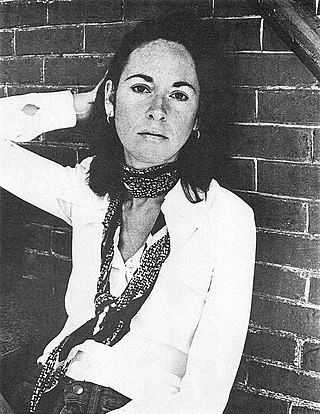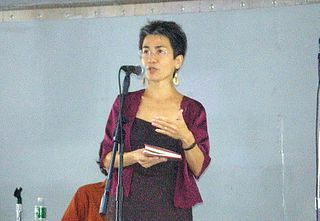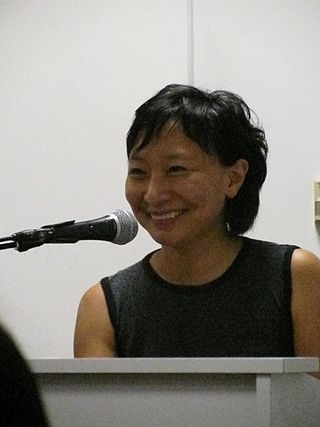
Louise Elisabeth Glück was an American poet and essayist. She won the 2020 Nobel Prize in Literature, whose judges praised "her unmistakable poetic voice that with austere beauty makes individual existence universal". Her other awards include the Pulitzer Prize, National Humanities Medal, National Book Award, National Book Critics Circle Award, and Bollingen Prize. From 2003 to 2004, she was Poet Laureate of the United States.
Alice Fulton is an American author of poetry, fiction, and nonfiction. Fulton is the Ann S. Bowers Professor of English Emerita at Cornell University. Her awards include the American Academy of Arts and Letters Award in Literature, National Endowment for the Arts Fellowship, Library of Congress Rebekah Johnson Bobbitt National Award, the MacArthur Fellowship, an Ingram Merrill Foundation Award, as well as a Guggenheim Fellowship.

Jennifer Michael Hecht is a teacher, author, poet, historian, and philosopher. She was an associate professor of history at Nassau Community College (1994–2007) and most recently taught at The New School in New York City.

Kimiko Hahn is an American poet and distinguished professor in the MFA program of Queens College, CUNY. Her works frequently deal with the reinvention of poetic forms and the intersecting of conflicting identities.
A monostich is a poem which consists of a single line.

Jane Hirshfield is an American poet, essayist, and translator, known as 'one of American poetry's central spokespersons for the biosphere' and recognized as 'among the modern masters,' 'writing some of the most important poetry in the world today.' A 2019 elected member of the American Academy of Arts & Sciences, her books include numerous award-winning collections of her own poems, collections of essays, and edited and co-translated volumes of world writers from the deep past. Widely published in global newspapers and literary journals, her work has been translated into over fifteen languages.
Myung Mi Kim is a Korean American poet noted for her postmodern writings. Kim and her family immigrated to the United States when she was nine years old. She holds a Masters of Fine Arts from the University of Iowa and lectured for some years on creative writing at the San Francisco State University. She is currently Professor of English at the University at Buffalo.
Buddhist poetry is a genre of literature that forms a part of Buddhist discourse.

Cathy Park Hong is an American poet, writer, and professor who has published three volumes of poetry. Much of her work includes mixed language and serialized narrative. She was named on the 2021 Time 100 list for her writings and advocacy for Asian American women.
Poetry is a form of literature.
The Asian American Literary Awards are a set of annual awards that have been presented by The Asian American Writers' Workshop since 1998. The awards include a set of honors for excellence in fiction, poetry and nonfiction, chosen by a panel of literary and academic judges; a Members' Choice Award, voted on by the Workshop's members from the list of that year's entries; and a Lifetime Achievement Award. To be eligible, a book must be written by someone of Asian descent living in the United States and published first in English; entries are actively solicited by the Workshop.
Amy Catanzano is an American poet from Boulder, Colorado. She is the author of Multiversal, which won the PEN USA Literary Award in Poetry. Michael Palmer describes her work as "a poetic vision of multiple orders and multiple forms, of a fluid time set loose from linearity, and an open space that is motile and multidimensional." Since 2009 she has published writing on a theory and practice called "quantum poetics," which explores the intersections of poetry and science, particularly physics. Her other interests include cross-genre texts and the literary avant-garde.
Phillippa Yaa de Villiers is a South African writer and performance artist who performs her work nationally and internationally. She is noted for her poetry, which has been published in collections and in many magazines and anthologies, as well as for her autobiographical one-woman show, Original Skin, which centres on her confusion about her identity at a young age, as the biracial daughter of an Australian mother and a Ghanaian father who was adopted and raised by a white family in apartheid South Africa. She has written: "I became Phillippa Yaa when I found my biological father, who told me that if he had been there when I was born, the first name I'd have been given would be a day name like all Ghanaian babies, and all Thursday girls are Yaa, Yawo, or Yaya. So by changing my name I intended to inscribe a feeling of belonging and also one of pride on my African side. After growing up black in white South Africa, internalising so many negative 'truths' of what black people are like, I needed to reclaim my humanity and myself from the toxic dance of objectification." She has also said: "Because I wasn't told that I was adopted until I was twenty, I lacked a vocabulary to describe who I am and where I come from, so performing and writing became ways to make myself up." As Tishani Doshi observes in the New Indian Express: "Much of her work is concerned with race, sexuality, class and gender within the South African context."
Sunflower Splendor: Three Thousand Years of Chinese Poetry is an anthology of around 1,000 Chinese poems translated into English, edited by Wu-chi Liu and Irving Yucheng Lo and published in 1975 by Anchor Press/Doubleday. Wu-chi Liu served as the anthology's senior editor. As of 2002, the book had been widely used in Asian literature studies. In 2002 Stacy Finz of the San Francisco Chronicle wrote that the book "was a best-seller".
Earshot is a book of poems by Kimiko Hahn, published in 1992 by Hanging Loose Press. It is Hahn's second poetry collection, after Air Pocket (1989). The book contains 46 poems. In 1993, Earshot received an Association of Asian America Studies Literature Award. In 1995, it was awarded the Theodore Roethke Memorial Poetry Prize.
Kaya Press is an independent non-profit publisher of writers of the Asian and Pacific Islander diaspora. Founded in 1994 by the postmodern Korean writer Soo Kyung Kim, Kaya Press is housed in the Department of American Studies and Ethnicity at the University of Southern California.

Beachy Head (1807) is a long blank verse poem by the English Romantic poet and novelist Charlotte Turner Smith. Smith wrote Beachy Head between 1803 and 1806, near the end of her life, when she was struggling with debt and ill health. As the poem was being composed, England was engaged in the Napoleonic Wars with France, and Beachy Head was regarded as a likely invasion point for the French army; nonetheless, Smith continued to support French revolutionary ideals. The poem was published the year after her death, as part of the volume Beachy Head and Other Poems. It was her last poetic work, and has been described as her most poetically ambitious work.

Foreign Bodies: Poems is a 2020 poetry collection by Kimiko Hahn, published by W. W. Norton & Company. It is Hahn's tenth book of poetry.

Toxic Flora: Poems is a 2010 poetry collection by Kimiko Hahn, published by W. W. Norton & Company. Hahn's eighth book of poems, it was awarded an Asian American Literary Award from the Asian American Writers' Workshop in 2011.
Tamiko Beyer is an American writer, editor, and activist. She is the author of several books, including Last Days, a poetry collection that won the Lambda Literary Award for Lesbian Poetry, and Poetry as Spellcasting, an anthology co-edited with Destiny Hemphill and Lisbeth White.








